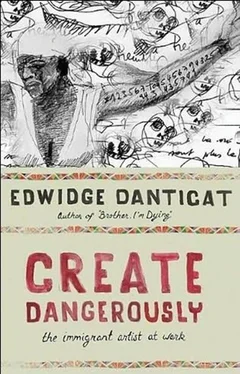Patricia guided her slowly toward the moment when the paramilitary men, called attachés, came to her house in Port-au-Prince.
They wanted to wipe out everyone who’d voted for Aristide, she said. Her husband, because of his election organizing, was targeted. They came knocking on her door. When her husband saw who they were, he escaped through a window in the back of their house. He thought that if they didn’t find him they would simply go away. He never thought they’d take her in his place.
They put her in the back of a pickup truck and drove her to a deserted stretch of land outside of town, Haiti’s so-called valley of death, a vast mass grave called Titanyen. There two men hacked her with machetes. When she realized that they were trying to kill her, she stopped fighting, lay down, and played dead. She lost the arm, she said, trying to shield her face and the rest of her body.
When the paramilitary men saw that she had stopped moving, one of them said, “Look, it seems like she’s dead.”
“They had more people to kill,” she said, “so they left me there.”
She waited until they were gone. Then she dragged herself back to the side of the road and waited until morning.
As she spoke, slowly but firmly, as if reliving every second of these horrors, I wrote a summary translation on a legal pad for one of our non-Creole-speaking producers. I felt tears run down my face. This was perhaps unprofessional, even disrespectful. The telling of that story was such a courageous act, I thought, that only one person in that room had the right to cry.
Alèrte Bélance: I woke up again the next morning and found myself stuck on top of a briar path where the zenglendo threw me. My whole body was full of prickers. I didn’t feel them, though, because my whole body was dead. I’m not positive where I was because I couldn’t see-my eyes were stuck together with blood-but I think I was up in the air, perched on the side of a hill, just over a hole. I felt myself shaking, my whole body was trembling. I unstuck my eyes and then I saw that I wasn’t too far from the road. But I couldn’t see up or down, I couldn’t move to the left or right. Anywhere I turned, I would fall into the hole.
Patricia then moved on to her incredible survival.
“How did you get found?” she asked.
In the morning, on the precipice by the side of the road, she saw many cars speeding by. She stopped to raise her bloody arms to catch their attention. Some drivers, stopped and gawked and then got back into their cars and kept going. By then she was covered with the pikan , the thorns that are common in the area. One potential good Samaritan even said, “She’s not dead,” but kept going. Finally an army pickup truck came by and-proving that not all soldiers are the same-one of the two soldiers in the truck said, “We can’t leave that woman here.” They picked her up and put her in the back of the truck.
Tearful, Alèrte stopped talking and her husband picked up the narrative from there. During the entire interview, he referred to her in Creole as dam la , the lady, a rather formal but not impersonal designation.
After escaping to his aunt’s house in another part of town, Alèrte’s husband returned home the next morning. The children told him that their mother had been taken away by the men who’d come the night before. That same morning, a soldier came to the house and asked who he was. He hesitantly told the soldier his name. The soldier said, “You should come quick to the hospital. Your wife is sick. She may even die before you get there.”
When he got to the hospital, he did not recognize her. “That’s not my wife,” he told the doctors.
Alèrte had the presence of mind to nod her head to indicate to him that she was indeed Alèrte.
“She had long hair before,” he said, pointing to her buzz haircut. “But when I saw her, she was like the chopped meat they sell at the market.”
Later a human rights group would publish a brochure filled with pictures of Alèrte taken in the hospital after her attack. I had never seen anything like it: picture after picture of hollowed pockets of severed and swollen tissue all over her face, arms, and legs.
The doctors had to hide her when several attachés came looking for her in the hospital. There were many instances of attachés coming back to kill torture survivors in hospitals. A young man who had been left for dead in Titanyen was later taken to the hospital, and then was murdered in the hospital by paramilitary men as his grandfather watched helplessly. That precedent forced the doctors to hide her.
She was lucky to have had the doctors she had, she chimed in. Doctors like that are hard to come by for poor women in overcrowded hospitals in Haiti. The doctors hid her and, when the killers came by, they would say that she had died.
Slowly, she said, reaching up to touch the scars on the side of her face, she began to heal. But she did not want to give the impression that it was quick and easy, as in a movie. She remembered the infections over her entire body, when most of her wounds were filled with puss. She had to be on oxygen a lot of the time because her nasal cavities were too inflamed to take in enough air.
As she talked, her daughters played nearby. They had heard all this before, it seemed, and they could ignore it now, or they were simply protecting themselves by giggling together on the floor and disturbing the shoot. Their childish giggles reminded Alèrte to say that after all this, after she went from being a plump, voluptuous, long-haired woman to a skinny, buzz-cut amputee, her daughters also did not recognize her. Because of her new appearance, they did not know who she was. The younger of the two would pull a picture from the side of the bed, a framed picture of Alèrte looking fleshy and healthy and smiling. The child would carry the picture to her and say, “You are not my mother. This is my mother.”
It took the children a while to get used to her new body and the new, deeper voice she had as a result of her tongue having been cut in half and sewn back together again. The tongue had been hanging by a thread of flesh, but the doctors sewed it back on and, miraculously, it healed.
“It healed,” she said, “so I can tell my story, so people can know what happened to me.”
Her strength and resolve seemed to grow with each word, even as she said she got depressed sometimes because she couldn’t do much for herself or her family. She ached all the time from the wounds we could see and others we could not see. At night she ached even more because of the seren , the twilight air, which affected her bones. Her husband had to bathe her and comb the children’s hair. Something a man ought not to have to do, she added.
Her son was sitting quietly in a corner observing the shoot while her daughters played and ate candy in their Sunday dresses. Watching the girls, it occurred to me that when they are grown, they may look exactly the way their mother used to look.
“I think we are done,” Patricia said at the end of the interview.
Alèrte’s body slid down on the couch. She seemed relieved. Her eyes traveled around the room, and then she asked Patricia, “ Kote w soti? ” Where are you from?
Patricia told of her origins in shorthand. Born in Haiti. Mother French. Father Haitian. Raised in Queens.
“Do you like New Jersey?” Patricia asked.
She did not go out much, Alèrte said. People stared. She had just been invited to appear on the Phil Donahue Show , though, and had agreed to go and, with a translator, tell her story.
“If it helps Haiti,” she said.
Suddenly, her son edged closer. Patricia asked him if he wanted to say something.
The boy said yes.
Читать дальше












